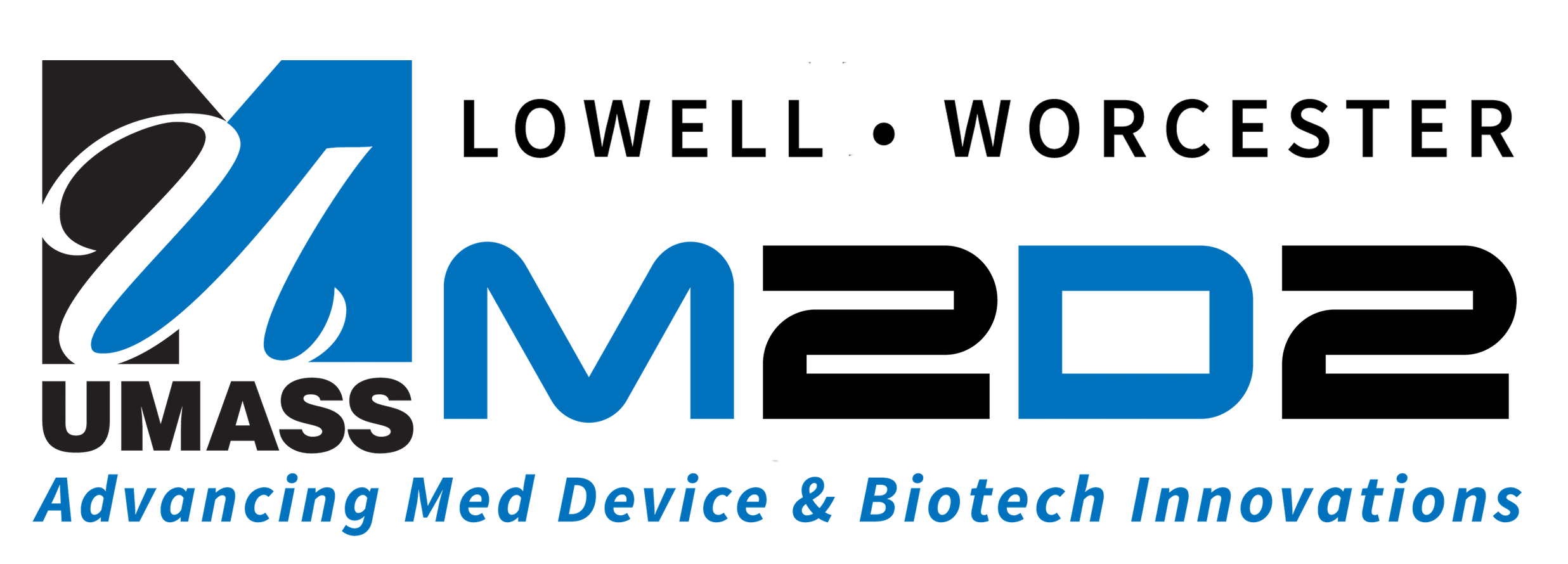Sponsors and Rules
M2D2, the Massachusetts Medical Device Development Center, is a joint initiative of the Lowell and Worcester campuses of the UMass system. Its aim is to help new biotech and medical device entrepreneurs develop products every step of the way, from proof-of-concept to commercialization. Its affiliated faculty and staff have assisted more than 100 start-up companies and entrepreneurs since the program kicked off in the spring of 2007.
I. The M2D2 $200K Challenge is interested in receiving a broad range of applications and is seeking biotech, diagnostic and medical device technologies.
Sponsors and Areas of Interest
Amgen
- Large molecule drug delivery technologies that simplify and optimize the patient experience (ex. tissue-specific delivery, long acting doses, self-administration)
- Digital and/or device-based technologies to support medication adherence or delivery
- Next generation miniaturized, highly parallel and/or rapid analytical systems for:
- Measuring large molecule solution attributes (ex. viscosity, aggregates, impurities)
- Aseptically measuring attributes of single cells (ex. cell surface antigens, adherence propensity)
- High-throughput sample preparation for large molecule multi-attribute measurements (ex. digestion, labelling)
- Advanced cell-based (or surrogate) assays for critical quality attribute assessment
- Modular systems for synthetic molecule continuous manufacturing (ex. light catalyzed or enzymatic micro-reactors)
- Automation hardware and software to support high-throughput experimentation
Asahi Intecc
- Novel vascular diagnostic and therapeutic medical devices
- · Novel endoscopic-related diagnostic and therapeutic medical devices
BARDA DRIVe
- Technologies and methods that can signal infection or injury before the onset of noticeable symptoms
- Technologies that provide early health status information to medical care providers
- Host-based diagnostics, monitoring devices and predictive analytics tool
- Host-targeted therapeutics and clinical management approaches
- Technologies that utilize alternative routes of administration for administering therapeutics (oral, intranasal, transdermal patches, sublingual, and buccal mechanisms of administration)
- Technologies that enable easier deployment/uptake of therapeutics and can be administered without a trained health-care professional
- Advanced Manufacturing Technologies – The purpose of the innovations and enhancement to advanced manufacturing technologies may include but is not limited to improving pharmaceutical quality, rapidly scale manufacturing capabilities, shorten supply chains, increase manufacturing resilience to disruption, accelerate availability of emerging therapies/vaccines, and reduce the risk of pharmaceutical shortages. Advanced manufacturing technologies may include but is not limited to continuous manufacturing and additive manufacturing (including 3D printing)
Boston Scientific
- Applications for robotics in medical development and delivery
- AI (Artificial Intelligence) tools and applications to optimize and automate development, manufacturing and/or supply chain in order to increase efficiencies and provide lower overall cost of healthcare for patients
- Novel materials, coatings, or processes to enhance manufacturing, performance and distribution/shelf life of medical devices.
- Point of care technologies for:
- Heart
- Blood
- Lung
- Sleep disorders
Hologic
- Devices intended to simplify and improve therapeutic procedures in the women’s health space, filling treatment gaps and advancing patient care.
- Conditions of interest include:
- Fertility
- Laparoscopic GYN surgery
- Pelvic organ prolapse
- Fecal incontinence
- Pelvic/bladder pain
- Contraception (non-hormonal)
Johnson & Johnson
- Cardiovascular/AFib
- Obesity
- More durable interventions
- Prevent/reduce morbidities
- Osteoporosis
- Minimize fracture reate
- Improve healing
- Sports Medicine
- Rotator cuff healing and repair
- Cartilage repair
- Surgery
- Improved treatment options
- Minimally invasive procedures
- Osteoarthritis
- Early interventions
- Better surgical outcomes
- Neurovascular
- Surgical oncology
- Fracture healing
- Anti-infectives/
- Disc degenerative disease/
- 3D printing
- Digital surgery
- Wound healing
- Vision
- Contact lens (myopia, astigmatism & hyperopia, beauty & performance)
- Dry eye
- Surgical (cataract & refractive)
- Glaucoma
- Health technology
- Smart device for therapy delivery
- Disease interception; prevention
- Digital & mobile wellness
- Patient; consumer engagement
- Lung cancer
- Holistic solutions
- Consumer products, diagnostic, medical devices & pharmaceuticals
Kohler
- Novel/innovative point-of-care and in-home health technologies/services to provide better patient outcomes and to support healthcare more broadly
Sarepta Therapeutics
- AAV Gene Therapy
- CRISPR/Cas9 Genome and Epigenome Editing
- PMO Antisense Oligonucleotides for splice modulation or translational inhibition
Challenge Rules
- An Applicant can be a duly-organized and existing legal business entity, including a partnership, corporation, limited liability company, or joint venture, or similar business organization or association under the law of the jurisdiction in which the Company is organized. The applicant can also be an individual or team with a venture involving technologies licensed from universities or research labs.
- If the applicant is a Company, it can be organized as a for-profit or non-profit entity.
- If the applicant is a Company, it must be in good standing in the state in which it is organized.
- All technology involved in the venture must be advanced enough that it is capable of demonstration.
- Company will be encouraged but not required to locate at M2D2.
- The $200K Challenge welcomes international applicants.
- Unmet need
- Area(s) of focus
- A. proposed solution B. clinical status C. market status D. regulatory pathway and status
- Competitive Advantage
- Scope
- Management team
- Funding Requirements and Financial Forecast
- Business Plan
- Level of interest expressed in interacting with M2D2 and program sponsors
- Articles or Certificate of Incorporation (corporation) or Articles of Organization (limited liability company) or Articles of Limited Partnership, or similar publicly filed organic documents.
- By-laws (corporation), Partnership Agreement, or Operating Agreement (limited liability company).
- Certificate(s) of good standing from the Commonwealth of Massachusetts and, if applicable, from state or country of organization.
- Redacted License Agreements, where applicable, noting Company’s IP rights.
